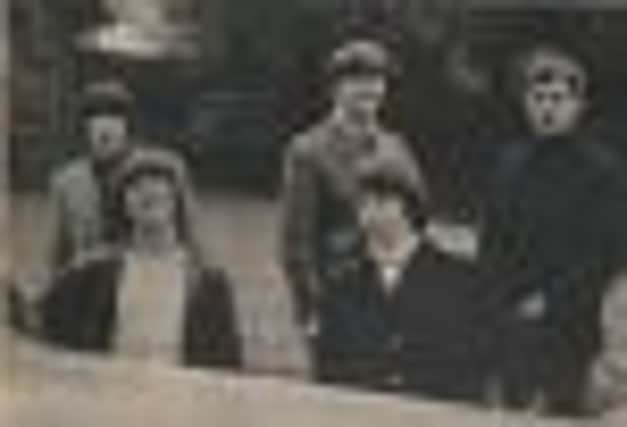Obituary: George Gallacher, critically acclaimed Glaswegian singer who fronted popular blues band the Poets


George Gallacher, lead singer of one of the most popular Scottish rock bands of the mid-1960s, the Poets, died of cardiac failure on Saturday, 25 August. He was 68 years old.
Born in 1943 in what’s now the Royston district of Glasgow, Gallacher formed the Poets around late 1962 with guitarists Hume Paton and Tony Myles, along with bassist John Dawson and drummer Alan Weir.
Advertisement
Hide AdAdvertisement
Hide AdLike hundreds of teenage bands forming around the same time throughout the British Isles, the Poets initially looked to American rhythm and blues for much of their inspiration. Unlike many such combos, however, they wrote their own material from the start, Gallacher co-penning all of the songs the Poets generated for their first five singles, released between late 1964 and early 1966.
“Though we were limited in respect of playing technique – there were many brilliant players at the time in Scotland – we left them all standing in terms of playing discipline,” declared Gallacher in a 1999 interview for my book Urban Spacemen & Wayfaring Strangers: Overlooked Innovators and Eccentric Visionaries of ‘60s Rock.
“We were the tightest band around, rehearsing every day, even though our playing schedule was hectic, sometimes playing three gigs a night at the weekends.”
While they could play hard-driving bluesy rock’n’roll, the group’s original material emphasised haunting, folky melodies and Gallacher’s eerie vocals.
Their unusual blend of Merseybeat, R&B, and minor-keyed tunes was heightened, according to George, by using two guitars with “the first and second strings tuned the same, thereby creating a semi-12-string effect. Add this to the minor melodies, and there is the seminal Poets sound.
“A very distinctive sound, and potentially very commercial.”
One person who thought so was original Rolling Stones manager/producer Andrew Oldham, who auditioned the band after spotting a photo of the Poets in Beat News during a trip to Scotland. Within a few weeks, Oldham had produced their debut single, Now We’re Thru, released in October 1964 on the Decca label. Peaking at number 31 in the UK charts, it seemed a promising beginning for the Glaswegian outfit.
Yet it would be their sole chart entry, although the group issued five more 45s over the next couple of years (including a couple on the label Oldham co-founded, Immediate Records) that are highly esteemed by British beat collectors around the globe.
Advertisement
Hide AdAdvertisement
Hide AdThough immensely popular in their native Glasgow, the Poets could not crack the wider British or international market with their series of adventurous singles, the first four produced by Oldham, and the fifth by Paul Raven, later to gain notoriety as Gary Glitter.
“The thing for Andrew was the fact that our stuff had no precedence,” mused Gallacher. “It wasn’t blues or rock’n’roll-based, it came from nothing he had experience of, so it was a challenge to him every time.
“Although he produced fabulous stuff for the early Stones, the fact that their material was derivative, ie very blues-influenced, meant that there was a kind of predictability about the finished tracks. With us there was no such thing, and he got off on that.”
The Poets underwent several personnel changes in the mid-1960s, with George marrying guitarist Fraser Watson’s sister Anne in 1967, about two years after Watson replaced Tony Myles.
By that time, Gallacher had left, as “there were rifts in the band developing about what direction we should be going in”. The interference of Hume Paton’s father in the group’s affairs, he added, “eventually drove Andrew and us apart, and by then I’d had enough. When I went, so did Andrew.”
The Poets recorded their sixth and final single without their original lead singer, and Gallacher did continue writing songs, recording some as demos later in the 1960s with Watson’s subsequent more psychedelic-flavoured outfit, the Pathfinders.
Although a lengthy career in the record business wasn’t in the cards for Gallacher, he remained an active performer, often in groups with brother-in-law Watson.
For a while, the pair played with drummer Dougie Henderson in the Dead Loss Band, “essentially a heavy rock band, very loud and self-indulgent and heavily aligned to far-left politics. Our music reflected the politics of the 70s and early 80s, but we never sought a record deal though there was some interest in us.”
Advertisement
Hide AdAdvertisement
Hide AdAdding Scott McGowan, they continued as the Blues Poets in the 1990s, the same decade Gallacher earned a post-graduate degree in teaching. In his later years he taught English and music at Hillhead, Hyndland, and Holyrood schools, and worked with asylum seekers and immigrants at St Roch’s in Sighthill.
Shortly before his death, Gallacher and Watson had been playing as the Poets with backup by Edinburgh band the Thanes, doing a BBC Radio Scotland session in late 2011. Gallacher is survived by his wife, Anne, and sons Craig and Fraser.
Summarising his most renowned band’s legacy in 1999, Gallacher stated: “There is a lovely little maxim from the 19th-century art critic John Ruskin that says all about the Poets’ stuff: ‘It is far more difficult to be simple than to be complicated, far more difficult to sacrifice skill and cease exertion in the proper place, than to expand both indiscriminately.’”
Quoting a more contemporary source, George added: “The much respected literary and music critic Brian Morton said on a recent documentary, ‘Unlike all others of the 500 bands in Glasgow at the time, whom people went to dance to, one went to a Poets gig to listen.’”
Richie Unterberger